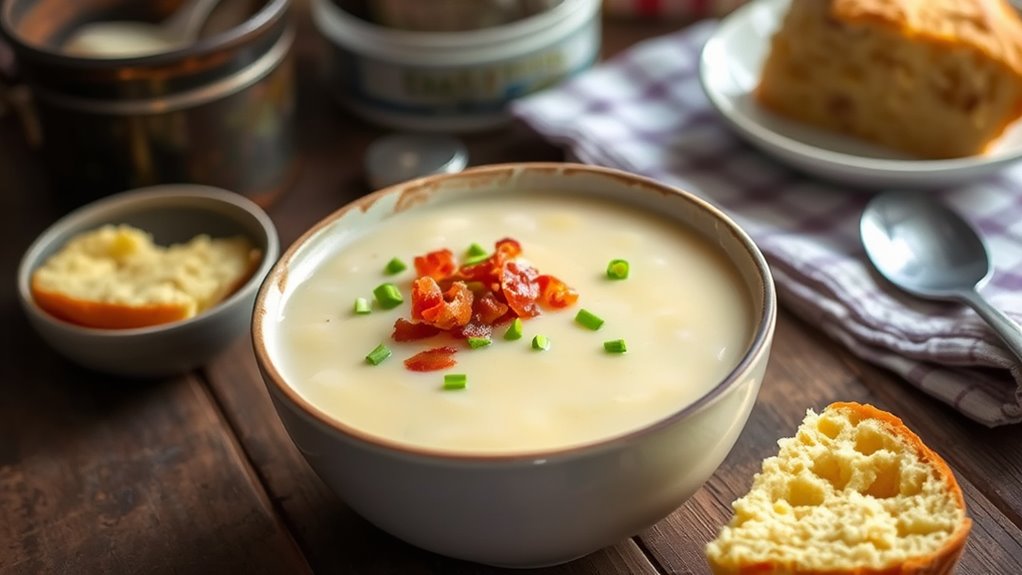Cracker Barrel-style Potato Soup is cozy and creamy, built around simmered potatoes, onions, and a smoky finish you’ll love. Start by sautéing onions in butter, whisk in a smooth roux, then gradually whisk in warm broth for a lump-free base. Add potatoes and aromatics, simmer until tender, and finish with a splash of cream. Garnish with chives and cheddar for contrast, and serve with crusty bread. Ready to uncover more tips and tweaks? You’ll find them below.
Ingredients and Quantity
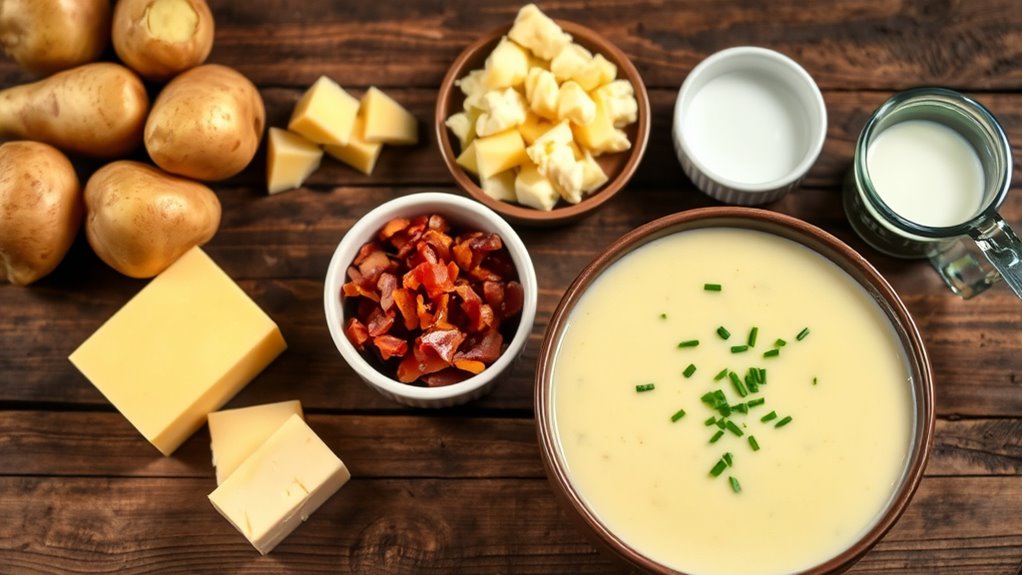
To make Cracker Barrel’s potato soup, you’ll need a concise pantry of ingredients: russet or Yukon gold potatoes, onions, celery, carrots, chicken or vegetable broth, milk or heavy cream, butter, flour, salt, and pepper. You’ll also consider potato varieties for texture and taste, dialing in seasoning options to taste. I’ll keep it precise, so you can shop fast.
| Item | Quantity |
|---|---|
| Potatoes (russet or Yukon gold) | 4–5 medium |
| Onions | 1 medium |
| Carrots | 2 medium |
| Celery | 2 stalks |
| Broth | 4 cups |
| Milk/cream | 1–2 cups |
| Butter & flour combo | 2 tbsp butter, 2 tbsp flour |
| Salt & pepper | to taste |
Preparations
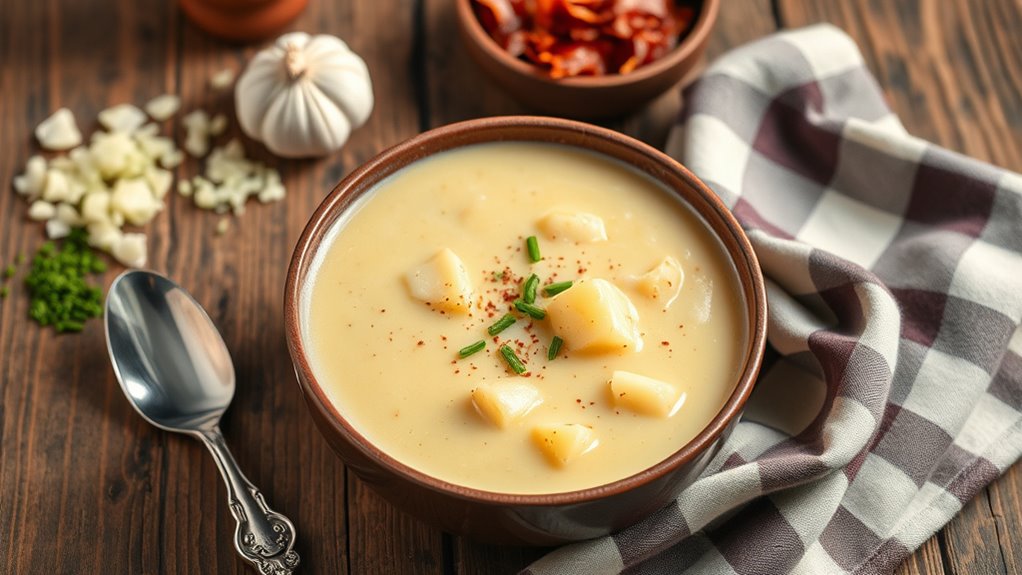
Start by prepping your vegetables: peel and dice the potatoes into even chunks, mince the onion, and slice the carrots and celery so everything cooks evenly. In this Preparations section, you’ll map out efficient workflow instead of guesswork. Begin with mise en place: gather ingredients, rinse greens, and measure liquid and seasonings. Preparation techniques matter here—season each component as you go, building depth without overloading the pot. You’ll want even cuts for uniform simmering and a balanced texture. Prioritize timing: add potatoes first, then aromatics, so flavors layer naturally. For seasoning options, keep a flexible approach: salt, pepper, paprika, garlic powder, and a touch of liquid smoke or jalapeño for brightness. Stay precise, concise, and intentional to preserve the crisp, comforting identity of Cracker Barrel potato soup.
Kitchen tools or Kitchenware Required
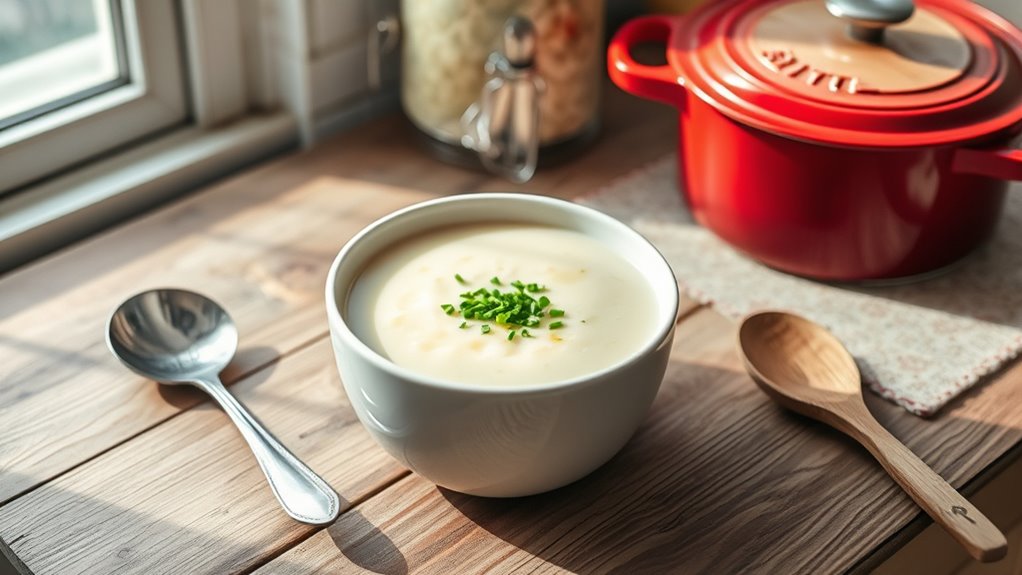
You’ll need the right tools on hand to keep Cracker Barrel potato soup moving smoothly from stove to bowl: a sturdy 6- or 8-quart stockpot for simmering, a sharp chef’s knife for cleanly diced potatoes and aromatics, and a cutting board that won’t slide.
Kitchen essentials keep you efficient. Below, you’ll see how the core cooking utensils shape the workflow and flavor, without fuss.
| Tool | Purpose | Benefit |
|---|---|---|
| Stockpot | Simmer soup evenly | Prevents scorching, holds heat |
| Chef’s knife | Dice and slice | Precise, quick prep |
| Cutting board | Stable surface | Safe, reduces slips |
How to Cook
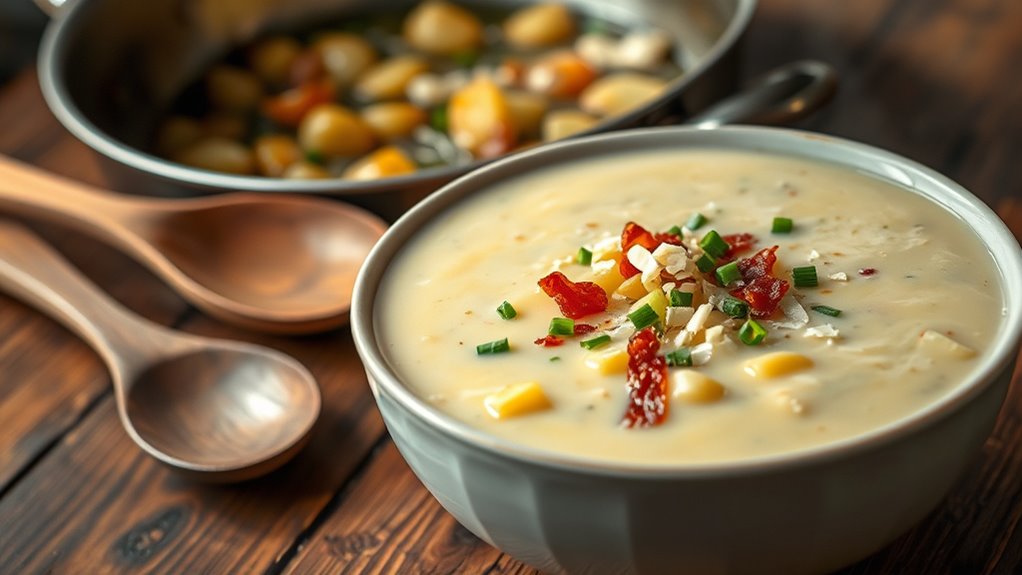
- Prepare your tools and potatoes before starting.
- Sauté onions and garlic in butter until they become translucent.
- Add bacon to the pan for a smoky flavor.
- Stir in flour to form a smooth roux.
- Gradually whisk in warm broth to prevent the mixture from seizing.
- Add potatoes and simmer until they are tender.
- Fold in cream to achieve a velvety texture.
- Taste the soup and adjust seasoning with salt, pepper, and a pinch of paprika or thyme.
- Offer toppings such as shredded cheese, chives, and cracked pepper for added contrast.
- Use cooking techniques that enhance aroma, like gentle simmering and avoiding boil-overs.
- Consider optional variations like adding corn, leeks, or chipotle, while maintaining core richness and a clean finish.
How to Serve
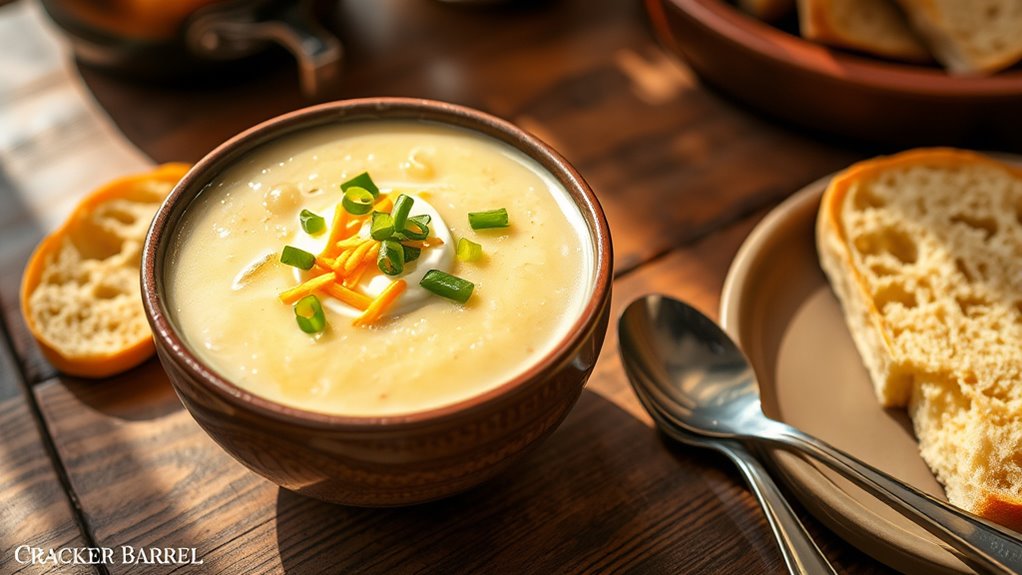
Cracker Barrel Potato Soup is best enjoyed warm, with thoughtful garnishes and polite portions that invite second helpings. You’ll approach serving with intention: ladle into bowls, leaving a modest margin for toppings, and plate with confidence. Consider garnishing options that elevate flavor without clutter—thinly sliced green onions, a dollop of sour cream, a light dusting of cheddar, and a few crispy bacon bits for contrast. Keep tempo steady; offer warm, crusty bread or a simple side salad to complement richness. With regard to serving suggestions, present each bowl with a small spoon tucked alongside and a note about reheat guidance if you’re sharing leftovers. Focus on clarity, balance, and approachable elegance, inviting every guest to savor, not rush.
Tips
To make the most of Cracker Barrel Potato Soup, start with high-quality ingredients and careful prep: potatoes should be starchy for a creamy texture, bacon crispy for bite, and onions minced fine enough to soften without releasing harsh sweetness. In Tips, you’ll optimize flavor through technique. Keep the simmer steady to meld flavors without overcooking; avoid rushing prompts that dull texture. For garnishing options, choose crisp counters: chives, shredded cheddar, and a dollop of sour cream add contrast without masking the base. Explore seasoning variations with restraint—salt in stages, a whisper of white pepper, and a pinch of paprika for warmth. Serve with a crusty loaf to elevate each spoonful, and trust your palate to tailor heat and creaminess to personal preference.
Food Value and Benefit
Potato soup is a nourishing dish that provides a well-rounded mix of macronutrients and micronutrients essential for energy and overall health. The creamy texture comes from starch-rich potatoes, while added toppings like bacon contribute protein. Dairy ingredients supply calcium and potassium, supporting muscle function and nerve communication. Fats in toppings aid in satiety and the absorption of fat-soluble vitamins. Moderate sodium enhances flavor without overwhelming the palate.
- Provides complex carbohydrates for sustained energy
- Contains protein to support muscle repair and growth
- Supplies dietary fiber from potato skins, aiding digestion
- Offers vitamins C and B6, essential for immune function and metabolism
- Rich in minerals like calcium and potassium, promoting bone health and nerve function
- Includes fats that help absorb fat-soluble vitamins (A, D, E, and K)
- Moderate sodium content for flavor enhancement without excess intake
Eating potato soup supports practical nutrition by delivering quick energy, satisfying portions, and adaptability for various dietary preferences, allowing you to enjoy comfort food while maintaining wellness.
Frequently Asked Questions
Can I Freeze Potato Soup for Later Use?
Yes, you can freeze potato soup for later. For best results, follow freezing tips and use proper soup storage methods; cool quickly, portion, label, and freeze. When reheating, stir well, check texture, and enjoy with freedom.
What Variations Exist for Dairy-Free Versions?
Coconut-cuddlin’ coconut milk and cashew cream create dairy-free delights; you can swap creaminess for coconut milk or cashew base, use almond yogurt, or soy cream, seasoning smoothly with garlic, lemon, herbs, and bright nutritional yeast.
How Long Is Leftover Soup Safe to Keep?
Leftover soup is safe in the fridge for 3–4 days. For best soup safety, cool promptly, store in airtight containers, and reheat to steaming hot. In freezer, last 2–3 months with proper leftover storage.
Can I Make This in a Slow Cooker?
“Patience pays off,” you’ll find, yes—you can. In a slow cooker, you’ll enjoy slow cooker benefits, and cooking time shortens when you merge simplicity with flavor, letting you savor freedom while it simmers to perfection.
What Toppings Pair Best With Cracker Barrel Potato Soup?
Tasty toppings pair best with Cracker Barrel potato soup like crispy bacon, chives, shredded cheddar, and sour cream; they’re flavor enhancements that let you tailor each bowl. You’ll feel free, savvy, and perfectly satisfied with every bite.
References
- https://www.foodhistory.com/recipes/potato-soup.html
- https://www.seriouseats.com/potato-soup-5116233
- https://www.nutrition.gov/topics/whats-food/potatoes
- https://www.ncbi.nlm.nih.gov/pmc/articles/PMC5537794/
- https://www.cdc.gov/nutrition/foodbasics/vegetables/potatoes.html
- https://www.sciencedirect.com/science/article/pii/S2212670819310369
- https://www.eatright.org/food/nutrition/dietary-guidelines-and-myplate/potato-nutrition
- https://www.cooksillustrated.com/articles/5454-the-best-potato-soup
